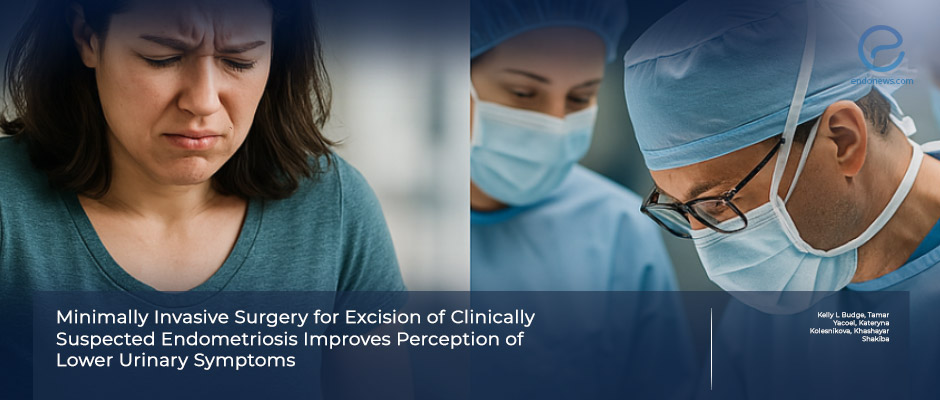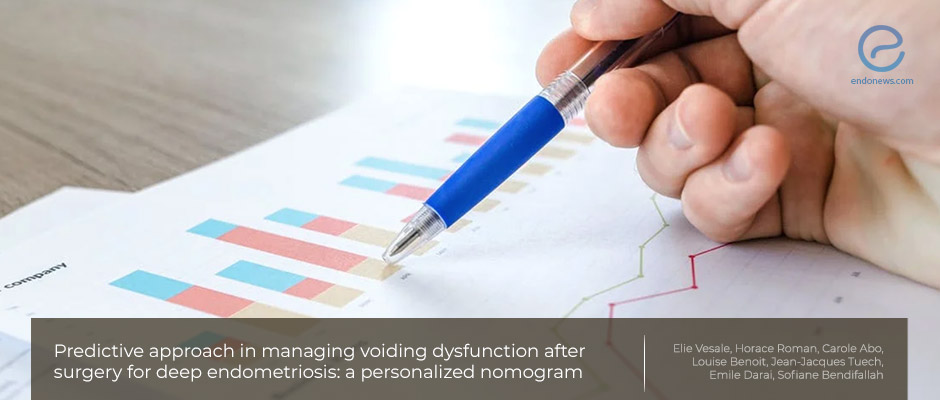Urinary Symptom Relief Following Excision of Suspected Endometriosis
Lower urinary tract symptoms such as frequent urination, urgency, and waking up at night to urinate, are often overlooked or dismissed in patients with endometriosis. A new study published in the Journal of Minimally Invasive Gynecology highlights that these symptoms may…
Key Points Lay SummaryStudy Identifies Factors Associated With Risk of UrinaryTract Endometriosis Recurrence
Being younger than age 25 and having an autoimmune disease are significant predictors of the recurrence of urinary tract endometriosis after surgery according to a new study published in the Journal of Minimally Invasive Gynecology. Adjuvant hormonal therapy, on the…
Key Points Lay SummaryThe accuracy of transvaginal ultrasound and magnetic resonance imaging for deep urinary tract endometrisis.
The prevalence of urinary tract endometriosis is 19-53% in patients within deep infiltrating endometriosis cases. The bladder and ureteral are the most common sites of the involvement. While preparing a radical surgery for a patient with deep endometriosis, the diagnosis…
Key Points Lay SummaryUrinary Tract Endometriosis
Endometriosis is mostly seen in patients of fertile age, and urinary tract endometriosis affects 1.2 to 6% of women with endometriosis. French coloRectal Infiltrating ENDometriosis Study (FRIENDS) group investigated the characteristics of urinary tract endometriosis in 232 patients from 31 centers. Authors…
Key Points Lay SummaryNerve-sparing technique for deep infiltrating endometriosis and its impacts on pelvic organ and sexual functions.
Deep infiltrating endometriosis and involvement of parametrium cause severe pelvic pain and dysfunction of some pelvic organs resulting in a reduction in women's quality of life. Although surgery for DIE aims to relieve pelvic pain, entering into the posterior parametrial…
Key Points Lay SummaryEgg or chicken, which is causing bladder symptoms, DIE or surgery for DIE?
Urinary symptoms could be overwhelming and sometimes could be hidden behind pain symptoms, but still might cause secondary damages on kidneys and bladder if remain undetected. In the prospective study conducted by Laterza et al, the authors questioned whether the…
Key Points Lay SummaryRoutine preoperative ureteral stent and complications in Deep Infiltrating Endometriosis
Deep infiltrative endometriosis is a devastating disease that includes both anterior and posterior compartments, and ureteral infiltration with endometriotic nodules affects 1 to 6% of all deep infiltrative endometriosis patients. In the study conducted by Giulia Borghese et al., the…
Key Points Lay SummaryPredictors of voiding dysfunction after surgery for deep endometriosis
While surgery for deep endometriosis provides relief and improves the quality of life in symptomatic patients for whom medical therapy has limited effect, it may also create postoperative lower urinary tract dysfunction. Moreover, postoperative voiding dysfunction could affect the quality…
Key Points Lay SummaryVoiding Dysfunction after Colorectal Surgery for Endometriosis
Postoperative voiding dysfunction is a less frequent complication of rectal shaving than that of discoid excision or segmental resection in patients undergoing colorectal surgery for endometriosis, regardless of its definition. This is according to a meta-analysis conducted by researchers from…
Key Points Lay SummaryComplexity of Urinary Tract Endometriosis: Highlights from a Review
Understanding the Clinical Complexity of Urinary Tract Endometriosis: Highlights from a Review While endometriosis predominantly affects the pelvic reproductive organs, spread to the urinary tract has also been observed and requires a different subset of surgical techniques for treatment. Accurate…
Key Points Lay Summary
 By Özge Özkaya
By Özge Özkaya


 By Selma Oransay
By Selma Oransay

 By Bahar Yuksel
By Bahar Yuksel





 By Timur Seckin
By Timur Seckin

 By Murat Osman
By Murat Osman